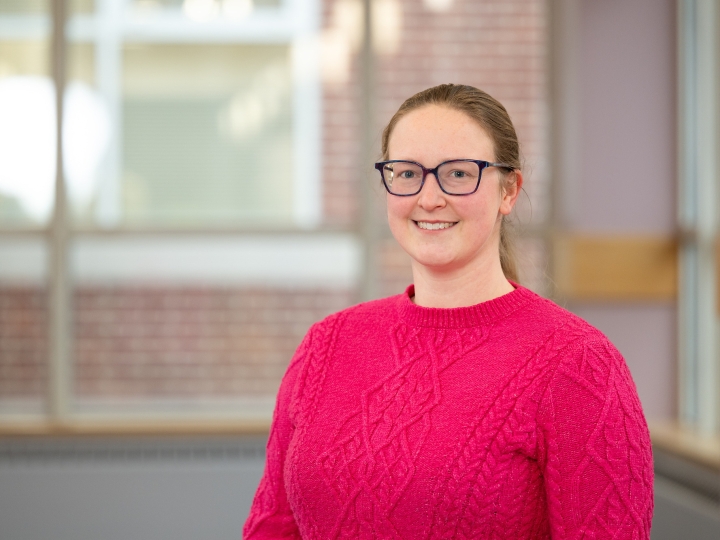
Bringing Life Back: Bucknell Researchers Work to Cure Impaired Pennsylvania Waterways
December 7, 2020
Replenishing leaves in local streams can not only revitalize the habitat but may also help mitigate the steady flow of pollutants through the Susquehanna River. Photo by Emily Paine, Communications
Driving through the countryside of Central Pennsylvania, it's easy to see how essential farming and food production are to the state's industry. But those same leading enterprises that helped crown the Keystone State the "snack food capital of the world" have also caused notable damage to its natural landscape — especially the creeks and tributaries that flow through it.
Protecting those waterways has formed the core of Professor Matthew McTammany's biology and environmental studies & sciences work for nearly 20 years. And this fall, a team of Bucknell student researchers in McTammany's lab took experimental steps to restore these features by returning leaves to agricultural streams that have been deforested due to farming.
"When you take away trees that would normally be around the streams, you're removing one of the main food sources that organisms in these waterways live on, which is falling leaves. That, in combination with runoff from land development, causes frequent devastating events like toxic algal blooms," McTammany explains. "While we need farms, food processing sites and places for humans to live and work in general, we also need to minimize the impact of humans on healthy stream communities if we're going to preserve this wonderful landscape."

As a Presidential Fellow, Jordan Isaacs '23 assists the Buffalo Creek Watershed Alliance in monitoring the water chemistry of the tributary. Photo by Emily Paine, Communications
Central to that preservation are the Susquehanna River tributaries that form a primary freshwater source for the Chesapeake Bay, which has long suffered from oversaturation of sediments and fertilizers from agriculture. Replenishing leaves in local Pennsylvania streams can not only revitalize the habitat for pollution-sensitive dwellers like caddisflies and fungi, but may also help mitigate the steady flow of pollutants into the Chesapeake through absorption. "So any restoration we can do in our own backyard has the potential to reduce negative effects on a major East Coast river," McTammany says.
The Bucknell project focuses on three watershed sites that are part of a Susquehanna River tributary called Buffalo Creek: an upstream section and downstream section that have both undergone light bank restoration, and a third portion largely untouched by land development that serves as a control.
To kick off the study, biology majors Rebecca Kelly '21 and Jordan Isaacs '23 filled and placed small mesh packs of red maple and white oak leaves in each stream. Every few weeks during the fall 2019 and spring 2020 semesters, the students returned the packs to the lab to glean data on leaf breakdown and ecology. Then, in late November, the team joined McTammany to deposit more than 300 pounds of fallen leaves from Bucknell's campus trees into the water. Further analysis of fresh leaf packs in the coming months will measure improvements in biodiversity and stream health, informing the next steps in the yearslong project.
Ultimately, the team foresees those findings will have implications stretching far beyond the banks of Buffalo Creek. Working in partnership with the Pennsylvania Fish and Boat Commission, NorthCentral Pennsylvania Conservancy and the Freshwater Research Institute at Susquehanna University, they hope their data can inform and guide restoration efforts throughout the state and in other agricultural regions.

Rebecca Kelly '21 says knowing her work has a meaningful impact is what she values most about research at Bucknell. Photo by Emily Paine, Communications
"It's awesome being able to take the skills and knowledge you gain in the lab and directly apply them in the local community," says Isaacs, who fell in love with biology through her high school's Envirothon program, an academic competition similar to Science Olympiad. "Restoration projects like these are so important in a world affected by climate change. And I feel like I'm getting a head start having done fieldwork so early on in college."
As a Presidential Fellow, Isaacs also assists the Buffalo Creek Watershed Alliance in monitoring the water chemistry of the tributary, alongside her work with McTammany. The chance to do on-the-ground research from her first semester was one of the main reasons she chose Bucknell.
For Kelly, who herself hails from a rural town in upstate New York, "the emphasis on fieldwork at Bucknell ensures that your research really means something," she says. "It feels like you're making a positive difference, which is so cool to me."

